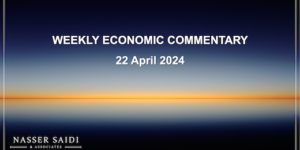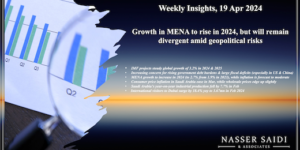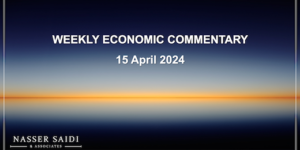Markets
At the beginning of the week stock markets worldwide extended the tumble recorded the previous Friday. Then after a few days dominated by a declining trend, ECB President Mario Draghi declared that the central bank is “ready to do whatever it takes” within its mandate to preserve the single currency and the tensions on the markets eased. Regional markets were mostly down with Saudi bourse bucking the trend. The euro made gains last week while the dollar advanced against the yen. Gold prices hit a 3-week high on Draghi’s statement while oil prices rebounded.
Global Developments
Americas:
- US Q2 GDP grew 1.5% qoq ann. following a revised 2.0% rise in Q1 (revisions went as far back as Q1 2009). The factor pulling down growth was household consumption – which grew 1.5% in Q2 compared to a gain of 2.4% in Q1.
- Against expectations, sales of new single-family homes in June declined 8.4% mom to 350,000 annualized units. However, performance is not as bad as the June reading indicates. The Census Bureau revised upward the May figure significantly to 382k, the strongest pace since April 2010. Meanwhile, pending home sales unexpectedly declined by 1.4% mom in June, following a strong 5.9% pickup in May.
- Durable goods orders surged 1.6% mom in June (May:1.6%), helped by aircraft orders (+14.3%) while orders excluding transportation dipped by 1.1% (vs 0.8%). Non-defense capital goods, a good proxy for business spending, was down 1.4% (May: +2.7%).
- Initial jobless claims fell 35k to 353k with the four-week moving average down to 367,250 – the lowest since March. These numbers need to be read with a cautious tone, as data are influenced by changes in yearly auto plants’ shut downs.
Europe:
- The UK GDP contracted -0.7% qoq in Q2 after a -0.3% drop in Q1. Inclement weather and the extended public holiday affected construction and mining, but overall the situation is bleak.
- The German Ifo business confidence index in July fell to 103.3 (the lowest since June 2010) from 105.2 in June, continuing a trend prevailing since April’s nine-month high of 109.8.
- Eurozone composite PMI held below 50 for a sixth consecutive month – at 46.4 in July. Manufacturing sector index fell to 44.1 from 45.1, while the output index fell to 43.6 – the lowest since May 2009. Though the services sector index increased to 47.6 from June’s 47.1, it remains in contraction territory. More worrisome were the dips in business expectations to 50.1 (52.1) and new orders to 42.9 (43.5).
- The net percentage of banks reporting tighter credit conditions in Euroland for corporates remained broadly stable at 10% in Q2.
- Credit conditions remained tight in Italy in Q2, due to declining demand for loans. The net percentage of banks reporting tighter conditions for enterprises remained unchanged at 25%. Banks expect to tighten the criteria for lending to enterprises in Q3.
- Moody’s lowered the outlook for Germany, the Netherlands and Luxembourg citing “rising uncertainty” over Europe’s debt crisis. S&P however affirmed the AAA status on the UK’s sovereign debt.
Asia and Pacific:
- The flash HSBC PMI for China in July rose from 48.2 last month to 49.5, a five-month high but still below the 50 threshold between growth and recession. While factory output is contracting at a mild pace, the employment sub-index indicated a sharper deterioration.
- Growth in Korea slowed to 2.4% yoy in Q2, the weakest performance since Q3 2009. Also consumer confidence in July declined to its lowest level in five months.
- Taiwan industrial production dropped -2.4% yoy well below expectations, in June, after -0.2% yoy in May. Production is falling victim of the global slowdown especially as demand for tech goods remains weak.
- The Philippines central bank reduced policy rates by 25bps to 5.75% while the Bank of Thailand held rates steady.
Bottom line: Last week, which began with escalating borrowing costs in Spain and Italy alongside revised ratings outlook from Moody’s, saw several statements from Eurozone officials: Draghi’s reassurance to the markets on the euro and the statement issued after the Merkel-Hollande meeting reiterating that the two countries were “deeply committed to the integrity of the euro zone”. Not only did these statements lift the euro out of its current misery, but also led to a slight dip in borrowing costs – in Spain and Italy by about 20bps and 14bps respectively.
Regional Developments
- Egyptian President Mursi named the US-trained, politically unaffiliated, Water Resources Minister Hisham Kandil as the country’s prime minister-designate, an appointment that sparked skepticism due to Kandil’s limited political and economic experience.
- The Central Bank of Egypt kept its overnight deposit and lending rates unchanged at 9.25% and 10.25% respectively, amid slowing headline inflation – 7.26% yoy and 0.55% mom in Jun (May: 8.30% yoy; 0.28% mom). Due to favourable base effects, annual core inflation also declined to 7.04% (May: 7.22%).
- The IMF announced a preliminary agreement with Jordan, providing access to credit facilities for 3 years valued at about USD 2bn to support the government’s economic reform program.
- Fitch affirmed Kuwait’s long-term foreign and local currency rating at ‘AA’ with stable outlook outlining its solid net foreign assets at 191% of GDP (in 2011) and persistent fiscal surpluses (since 1999) due to oil revenues – while identifying dependence on oil sector as a source of vulnerability.
- Fitch rating agency affirmed Bahrain’s long-term foreign currency sovereign rating at ‘BBB’ and local currency rating at ‘BBB+’ with stable outlook as internal political crisis effects waned, and fiscal and external positions remained quite stable. Bahrain is expected to receive substantial financial assistance from the GCC, mainly Saudi Arabia, will help ease budget constraints but are a disincentive to required reforms.
- According to the Saudi Ministry of Labour, it is a violation of the Kingdom’s labour regulations to insist that only single women are eligible for employment.
- A statement by the Jeddah Chamber of Commerce and Industry Chairman revealed that family businesses in Saudi Arabia contribute to about 25% of GDP (SAR 350bn) while only 156 of the 5000 family-owned companies are listed on the exchange highlighting its potential.
- Tunisia lost its two highest level financial authorities in the past few days. The central bank chairman was dismissed by Parliament due to his refusal to coordinate policies with the government. This decision raises the issue of central bank independence while the candidacy of the recently appointed central bank chairman was criticized. The Minister of Finance also resigned in disagreement with the government’s policies, in particular with excessive government spending and “unfair” central bank governor dismissal.
- In H1 2012, at least USD 68bn worth of Sukuk were issued globally, up 36% from H1 2011. Saudi Arabia recorded a notable performance with a benchmark sovereign sukuk, while Malaysia remained the largest overall issuer with 70% of the pie, according to Zawya.
- IFC investments in MENA’s private sector reached USD 2.9bn during last year. The IFC also remarked in its press release that public sectors in the MENA can no longer be the main source of job creation.
UAE Focus
- UAE’s Federal Authority for Nuclear Regulation announced it has given the green light to the Emirates Nuclear Energy Corp., or ENEC, to build two nuclear power reactors in Abu Dhabi, the first of 5 civilian power plants planned in the emirate.
- UAE oil minister Mohammad Al-Hamli declared that the government is happy with current oil prices as the market is well-supplied. Earlier the president of OPEC announced that his organization does not feel the need to hold an emergency meeting as oil prices are rising.
- The UAE Minister of Finance stated last week that there would be no bond issue to fund the estimated fiscal deficit this year. It was also announced that the MoF has completed its work on the preparation of the draft Federal Public Debt Law and this would soon be debated by the Federal government.
- The DIFC recorded a growth of 7% yoy in total value added in 2011, with financial sector accounting for 70.3% of the total. Total employees increased to 12945, of which 55.6% worked in the financial sector.
- In the first five months of 2012, UAE was the largest GCC market for Japanese products: exports to the UAE rose by 51% yoy to USD 3.8bn. Meanwhile, exports to Japan from UAE – consisting mostly of crude oil, gas and aluminium – increased by 17.3% yoy to USD 19.2bn in Jan-May 2012.
- In Abu Dhabi hotel and hotel apartment guests in H1 2012 grew 14% yoy to 1.189 mn while guest nights recorded an increase of 9%.
- Total real estate transactions in Dubai increased to AED 4bn in Q2, compared to AED 3.1bn in Q1. The number of residential transactions increased to 3,165 compared to 2,745 in Q1. This places the total value of residential property transactions in H1 2012 at AED 7.1bn, with an average deal value of AED 1.2mn. Meanwhile, Iranian investment – the fifth largest group of investors – in Dubai properties dipped by almost a quarter to AED 1.5bn in H1.
- The UAE Cabinet passed a motion for issuing a draft Federal Law making education compulsory until the age of 18 instead of the current elementary level.





